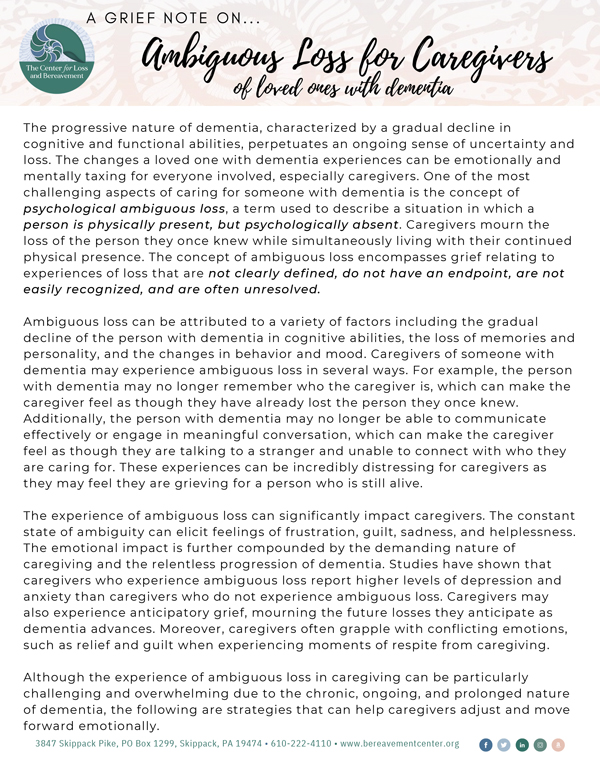CLB Grief Notes
A Grief Note On…
Ambiguous Loss for Caregivers of Loved Ones with Dementia
The progressive nature of dementia, characterized by a gradual decline in cognitive and functional abilities, perpetuates an ongoing sense of uncertainty and loss. The changes a loved one with dementia experiences can be emotionally and mentally taxing for everyone involved, especially caregivers. One of the most challenging aspects of caring for someone with dementia is the concept of psychological ambiguous loss, a term used to describe a situation in which a person is physically present, but psychologically absent. Caregivers mourn the loss of the person they once knew while simultaneously living with their continued physical presence. The concept of ambiguous loss encompasses grief relating to experiences of loss that are not clearly defined, do not have an endpoint, are not easily recognized, and are often unresolved.
Ambiguous loss can be attributed to a variety of factors including the gradual decline of the person with dementia in cognitive abilities, the loss of memories and personality, and the changes in behavior and mood. Caregivers of someone with dementia may experience ambiguous loss in several ways. For example, the person with dementia may no longer remember who the caregiver is, which can make the caregiver feel as though they have already lost the person they once knew. Additionally, the person with dementia may no longer be able to communicate effectively or engage in meaningful conversation, which can make the caregiver feel as though they are talking to a stranger and unable to connect with who they are caring for. These experiences can be incredibly distressing for caregivers as they may feel they are grieving for a person who is still alive.
The experience of ambiguous loss can significantly impact caregivers. The constant state of ambiguity can elicit feelings of frustration, guilt, sadness, and helplessness. The emotional impact is further compounded by the demanding nature of caregiving and the relentless progression of dementia. Studies have shown that caregivers who experience ambiguous loss report higher levels of depression and anxiety than caregivers who do not experience ambiguous loss. Caregivers may also experience anticipatory grief, mourning the future losses they anticipate as dementia advances. Moreover, caregivers often grapple with conflicting emotions, such as relief and guilt when experiencing moments of respite from caregiving.
Although the experience of ambiguous loss in caregiving can be particularly challenging and overwhelming due to the chronic, ongoing, and prolonged nature of dementia, the following are strategies that can help caregivers adjust and move forward emotionally.
Seek Support and Maintain Connections: Connecting with others who understand the experience can provide validation and a sense of belonging. Joining support groups, either in-person or online, allows caregivers to share stories, exchange advice, and find solace in a community of individuals facing similar challenges. Maintaining connections with family/friends can provide support and the opportunity to alleviate feelings of being alone and isolated. Additionally, consulting healthcare professionals, to better understand the progression of dementia and obtain guidance on managing challenging behaviors or symptoms can also be a support in caring for your loved one.
Educate Oneself: Learning about dementia can empower caregivers to manage expectations, adjust and develop alternative ways of communication, and find new avenues to connect with the person who has dementia. Understanding the stages of dementia and available resources equips caregivers to provide informed care and support. Educating oneself about dementia can also help caregivers anticipate and plan for changes that may occur, reducing feelings of anxiety and uncertainty.
Practice Self-Care: Engaging in self-care activities is vital for maintaining emotional well-being. As the old adage says, “you cannot give from an empty cup.” Prioritizing self-care enables caregivers to recharge and maintain physical and mental health. Taking time to engage in activities such as exercise, relaxation techniques, pursuing personal interests, and seeking respite through respite care services or assistance from other family members or friends are important in alleviating burnout. Additionally, taking care of oneself by eating healthy, getting enough sleep, and seeking medical attention when necessary is essential to overall wellbeing. Practicing self-care is not selfish and can help caregivers to reduce stress levels, improve mood, and maintain a sense of identity outside of the caregiving role, which ultimately aids in caring for others.
Acknowledge, Accept, and Validate Emotions: Acknowledging, accepting, and validating emotions, rather than trying to suppress or ignore them, is important in the caregiver role. It is normal to feel a range of emotions when caring for someone with dementia, including grief, sadness, frustration, guilt, and anger. These emotions are a natural response to the situation, and it is important to give oneself permission to experience whatever emotion is being felt. By acknowledging, accepting, and validating emotions, caregivers can reduce feelings of isolation and develop a sense of empowerment over emotional well-being. Remember to seek counseling or therapy to process emotions effectively when needed.
Identify and Implement Coping Mechanisms: Identifying and employing coping mechanisms tailored to individual needs can be beneficial. These may include journaling, engaging in creative outlets, practicing mindfulness or meditation, seeking therapy or counseling, and utilizing stress management techniques.
Adapt Communication Strategies: As the person with dementia experiences cognitive decline, adjusting communication strategies becomes crucial. This involves using clear and simple language, maintaining a calm and reassuring tone, and employing non-verbal communication cues such as gestures and visual aids to enhance understanding and connection.
Practice Acceptance and Redefining Relationships: Coming to terms with ambiguous loss involves accepting the changing nature of the relationship. Accepting change does not mean one has to like change but rather that one is open and tolerant to change instead of fighting against it. Adopting a “both-and” mindset, or dual thinking, can be beneficial in avoiding feelings of helplessness and hopelessness. For example, a “both-and” mindset might look like: the relationship has changed, which feels very much like loss, and yet a relationship still exists. Adopting the mindset that a person can both be absent, and present may help alleviate the need for absolute thinking. The ambiguity of caring for someone with dementia can be emotionally and psychologically draining but by redefining the nature of the relationship, holding a “both-and” mindset, embracing ambiguity, and focusing on providing comfort, love, and support in the present moment caregivers can find peace, build resilience, and reduce the burden of unmet expectations.
Adjust Expectations: Understand that your loved one’s behavior and abilities will change as dementia progresses. Adjusting expectations to align with current capabilities can help reduce feelings of disappointment and frustration. Additionally, caregivers that set realistic expectations may find it less stressful to adjust to the many changes dementia presents. It is important to accept that a person with dementia may not be able to do certain tasks or activities that they once could, and that caregiving can be a challenging and exhausting role. Being realistic about one’s own limitations and seeking help when needed is essential. By setting realistic expectations, caregivers can reduce feelings of frustration and disappointment, and focus on what can be controlled.
Embrace Moments of Connection: Focusing on enjoying the present moment together and what your loved one can remember and do is helpful when experiencing the ambiguous loss of dementia. Engage in activities that the person with dementia can still participate in and find joy in that connection. As dementia progresses, these moments may be few and far between making it challenging to identify areas in which your loved one can participate. In such cases, finding ways to connect with your loved one through reading a favorite book to him/her, listening to music once loved by both, and getting out in nature may be helpful. Cherishing these moments and finding joy and meaning in small interactions and gestures that offer glimpses of a loved one’s personality or emotional presence can be significant in maintaining a caregiver’s connection to their loved one.
Keep, Adapt, and Add Rituals: Although it is natural to feel that many things change when caring for someone with dementia, rituals do not have to. Rituals help to maintain a sense of predictability, continuity, and stability – which are not often felt when living with someone with dementia. This is even more reason to continue with family rituals of holidays, traditions, and celebrations. Being flexible and understanding that rituals can be altered to accommodate your loved one with dementia is helpful. Many losses occur along the dementia journey. It is important to grieve the losses as they occur and recognize them, by adding new rituals, as significant to you and your loved one. Involving others in loss rituals provides connection and lets others validate feelings of loss. Identify rituals that have meaning and symbolize what has been lost. Some examples of loss rituals include: playing a song, reading a poem, walking a familiar path or labyrinth, saying a prayer, lighting a candle, sending up a balloon.
Practice Stress Reduction Techniques: Engage in stress reduction techniques like meditation, deep breathing exercises, or mindfulness practices. These can help in staying grounded, managing anxiety, and maintaining emotional resilience. The less distressed a caregiver feels, the less distressed and behaviorally predictable the person with dementia will be.
Ambiguous loss is an inherent part of the dementia caregiving journey, causing significant emotional and psychological challenges for caregivers. By understanding and acknowledging the concept of ambiguous loss, caregivers can seek support, develop coping strategies, and navigate the journey with greater resilience and compassion. Embracing a multifaceted approach that includes seeking support, self-care, education, adaptive communication, and acceptance can aid caregivers in coping with this unique form of grief. For more information and indepth guideline on caregiving for someone with dementia including how to hold meaning, mastery, identity, ambivalence, attachment, and hope, turn to Loving Someone Who Has Dementia, written by Pauline Boss.
Boss, P. (2011). Loving someone who has dementia: How to find hope while coping with stress and grief. Jossey-Bass.
National Institute on Aging
www.ambiguousloss.com
Join Our
Mailing List
Donate
Today
Request
Information

Affiliations
• NACG
• CBEM Changemaker
• ADEC
• Charity Navigator
Quick Links
About Us
Individual & Family Grief Counseling
Volunteer
News
Grief Support Resources
Contact
Ph: 610-222-4110
Fax: 610-222-4116
3847 Skippack Pike
P.O. Box 1299
Skippack, PA 19474
Support The Center For
Loss and Bereavement
